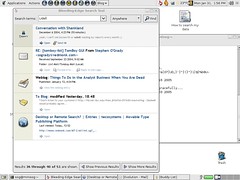An entry last week from Jon Udell rekindles the debate in my mind concerning information aggregation. You don’t have to be a longtime reader of this space to know that I’m a big believer in thin client network applications and services, and my own experiences with Gmail very much mirror Jon’s. In short, Gmail has proved a capable platform for the outsourcing of my mail storage/indexing/search/retrieval needs. It’s not for everyone, but put it this way: if Google offered a paid, enterprise version of Gmail that I could point our redmonk.com MX records at and even rudimentary shared calendar support, well, let’s just say Exchange would not be long for the RedMonk world.
But I think there’s a danger in conflating and comparing single task search, such as email, with general desktop search. Gmail, in my mind, is not an indictment of the future for local desktop search applications, because desktop-style search is one area where I think network applications’ abilities are somewhat limited. Gmail’s principle strength is, of course, email. It can be bent to other purposes, for sure, but essentially it’s an email store first and foremost. As a result, I think the indexing and search of information residing with network applications is largely one devoid of context, simply because most of us don’t push all of our relevant content to the network (yet).
As I’ve written about before, it’s the broader search made possible with desktop tools that makes their results so much more meaningful; the additional file types supported by local search tools can dramatically increase the contextual value of a simple query. Instead of searching simply email or photos, I can search both of those at once, along with IM, PDFs, Word/OpenOffice files, etc.
Take the included screenshot as an example – doing a search for Udell, I return values from webpages, Tomboy notes, GAIM IM Logs, and my Evolution mail store. Obviously I’m presented with more and wider results than if I had simply searched a webmail account.
Without a lot of pushing and syncing on my part, this is the type of contextual search that single purpose network applications cannot currently deliver. What’s more, unless I’m either receiving all of my necessary communications services from a single provider or can proxy everything through one, network applications will always lag desktops in terms of available content to search.
Maybe Jon’s right and “pervasive high-performance monitoring of that event stream will help us weave local storage and the cloud into a common information space,” but I think those days are a long ways off.
In the meantime, I expect both single task and general purpose search to flourish – with the network applications posing little to no threat to products like Copernic X1, GDS, MSN Search, or Beagle. Different tools for different jobs, as they say.

